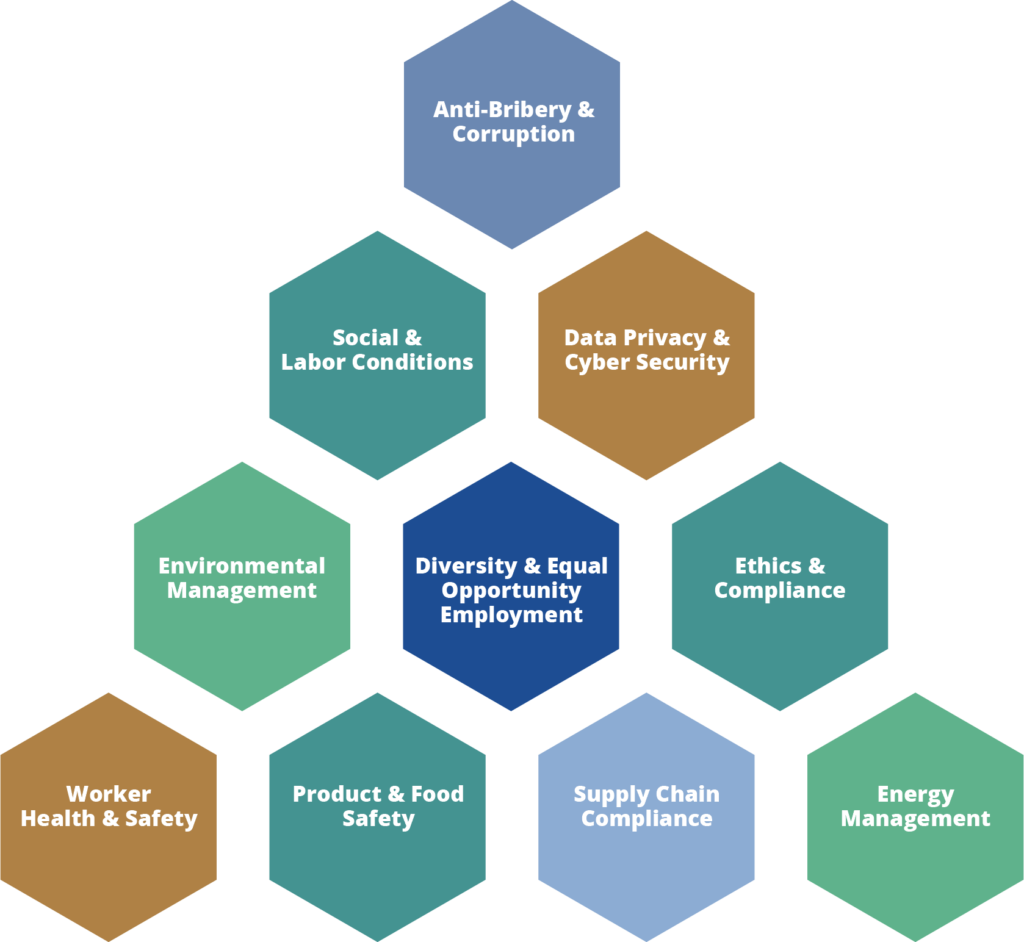SUSTAINABLE & IMPACT INVESTING
ESG
We will consider and manage material ESG risks, opportunities and impacts within our firm and throughout the diligence, stewardship and exit of our investments.
We strive to operate in accordance with industry standards such as the United Nations Principles for Responsible Investment while complying with all applicable laws and regulations.

OUR RESPONSIBILITY
In accordance with our fiduciary duties to our clients our investment policy provides that we:
- Maintain the highest standards of ethical conduct to ensure excellence in daily operations.
- Identify material issues using internal and external resources throughout the due diligence process to avoid or mitigate substantial risk, as well as to capitalize on opportunities that also further our Sustainability & Impact investment goals.
- Work with our portfolio companies during our ownership period to identify and support improvements in their approach to sustainability issues during the life of our investments and beyond.
- Maintain and enhance resources to support our Sustainability & Impact investment commitments.
- Encourage dialogue with our limited partners and other stakeholders regarding how we can better address issues pertinent to sustainability and impact investing in accordance with our and their core values and investment initiatives.
Promote transparency and accountability. - Include our actions and initiatives in matters relative to sustainability & impact investing in our periodical reports to limited partners.
SUSTAINABLE & IMPACT INVESTING
Our consideration of how sustainability and impact investing is affected and managed continues through the life of an investment as necessary.
In accordance with the plan established during the investment analysis process, our operating partners will work with each portfolio company’s management team to increase awareness, mitigate risks and create value through sustainable and impact opportunities.
This is done by the following:
- Provide ad-hoc policies and other key information to portfolio companies’ management teams when relevant.
- Ensure that the risks and opportunities are properly documented throughout the investment and mitigated or capitalized to the fullest extent possible.
- Encourage and empower portfolio company management teams to advance their own independent, robust approaches to sustainability management.
- Support and monitor each portfolio company’s management team to identify any new risk and opportunities as they may arise with changing circumstances in the community, environment and nature of the company.


IMPACT INVESTMENT
Impact investing is an exciting and rapidly growing industry powered by investors who are determined to generate social and environmental impact as well as financial returns.
We back mission-driven founders leveraging breakthrough innovations in science and technology to build a more sustainable and equitable economy in which both people and planet thrive.
We invest in companies that are innovating across industries in ways that will deliver big profits and measurable progress towards achieving the Sustainable Development Goals.
Our core investment thesis is that mission-driven companies outperform the market thanks to the magnetic force of purpose, which fuels intrinsic founder motivation and drives key competitive advantages in hiring, attracting resources, and building an enduring brand.

THE 5Ps OF IMPACT INVESTING
The 5P framework determining the impact of an investment for impact investors to generate measurable social returns, it’s critical to identify an investment strategy that specifies how the intended social outcome will be achieved.
We find it helpful to use a framework that describes the ways in which a company can drive positive impact, which we’ve adapted from the work by brian trelstad. we’ve summarized the “5ps of impact” to help i evaluate the potential for lasting social return from impact investments.
Businesses that are founded by and/or create opportunity for people historically underserved by existing markets can be categorized as having people-based impact. The potential to create income through jobs, business ownership, and services that increase the likelihood of gainful employment can create lasting change for individuals and their communities. This strategy can be applied to any industry and asset class. In fact, many impact investors consider the ownership and management of their investment funds based on a theory that women and minority fund managers are more likely to invest in women and minority CEOs, thereby creating a multiplier effect of a single fund investment.
Companies that base their operations where jobs are scarce or offer little upward mobility can drive economic development and positive impact at the place level. Developing markets and Opportunity Zones in the U.S. are both examples of this. Given the vast population in these markets and the potential to meaningfully change employment levels, median incomes, and standards of living, the potential scope of place-based impact is attractive to mission-driven investors. Companies and investors often encounter hurdles, however, due to the systemic challenges facing these communities. For example, the need for high levels of job training and robust infrastructure in under-resourced areas may cause operational friction. To help address these challenges, cross-sector partnerships with government agencies and nonprofits may be necessary components of an investment strategy.
Companies offering products and services that directly create positive impact benefit from a reinforcing tie between revenues and social good. Examples include companies providing access to energy efficient products, healthcare services, and educational content that drives better outcomes for students. Since customers purchase the company’s product based on its efficacy, management teams are incentivized to continuously strengthen and demonstrate the impact of their products, and impact cannot be easily decoupled if the company were to be acquired. Product-based impact does limit the investment universe, as not all industries offer goods and services that contribute positively to society. Impact investors thus need to consider the implications of sector concentration and look for other diversification methods within or outside their impact investing portfolio.
Impact at the process level refers to a company’s management practices. This may include employee wellness, manufacturing and supply chains, and other operational processes. All for-profit businesses can optimize environmental, social, and governance (ESG) practices in their operations, therefore process-based impact investing strategies can be applied across sectors and stages of growth. Many funds integrate ESG factors when making investment decisions; however, an investment strategy that includes active involvement with the business through the board of directors, a control investment, or other ways of directly influencing strategic decisions is typically necessary to generate a lasting social return. Given this high hurdle for efficacy, investment funds claiming impact at the process level need to be evaluated critically.
A paradigm is a model or pattern of doing business, and investment strategies looking to disrupt existing paradigms and create change at the systems level can be a powerful driver of innovation and impact. Paradigm-based investing strategies might be based upon shifting ownership structures to enable greater wealth creation (through Employee Stock Ownership Plans, for example) or intentionally seek to invest in companies disrupting existing industries in a way that enables greater access/participation (such as Massively Open Online Courses).
Impact investors differ from traditional investors in their intent to generate a measurable social impact in addition to financial returns. The ‘impact’ component of the investment strategy is essential and must be evaluated with the same rigor as the pure financial investment thesis. All 5Ps are valid strategies for generating positive impact, yet they each come with a set of pros and cons.
This framework for evaluating impact potential has been valuable to developing and refining Impact Engine’s investment strategy. Our venture fund is focused on investing in software companies whose products and services drive positive social impact, though we also consider select opportunities where companies are shifting the paradigm in their industry. Our new private equity strategy looks for compelling investments within each of the Ps that produce positive outcomes in education, health, economic empowerment, and environmental sustainability. We’ve found a rich pipeline of private equity impact funds and direct investments pursuing strategies to generate impact within middle market companies, and are optimistic about the potential for the emerging private impact ecosystem.
